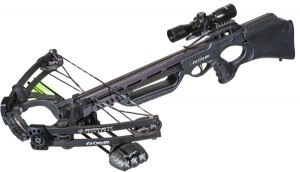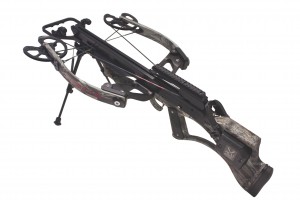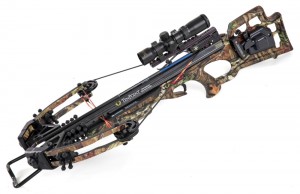Welcome to our best compound crossbow guide. We have seen many folks making the move towards crossbows from more traditional vertical bows. This is partly due to so many states now allowing the use of crossbows during archery season. It is also due to the increased technology being employed in modern crossbows, which is now allowing for extreme accuracy with much less effort than with vertical bows. Let’s start with our top 4 picks for 2020:
Top 5 Compound Crossbows
TenPoint Turbo GT Check price on Amazon.comBarnett Ghost 410 CRT Check price on Amazon.comCenterPoint Sniper 370 Check price on Amazon.comScorpyd Orion Extreme Check price on Amazon.comTenpoint Venom Check price on Amazon.com Velocity360 FPS410 FPS370 FPS400 FPS353 FPS Draw Weight175 lbs.185 lbs.185 lbs.110, 135, 160, 175 lbs.185 lbs. Crossbow Length35″37.3″36.5″34.5″34.6″ Suggested Arrow Length20″22″20″20″20″ Stroke12.6″15.375″13.5″18.5″13.5″ Crossbow Weight6 lbs. 8 ozs.7.3 lbs.7.9 lbs.7 lbs. 8 ozs.6.5 lbs. Our ReviewOur ReviewOur ReviewOur ReviewOur Review
Ballistic Data For The Coumpound Bows Above
A compound crossbow is an excellent combination between the most widely used vertical bow, the compound, and modern rifle technology. By pairing these technologies together, the modern crossbow is arguably the most accurate and most deadly limb-powered weapon on the planet.
So why then doesn’t every hunter in the field wanting to sling arrows use a compound crossbow? The list of reasons for or against is as varied as asking what caliber rifle is best to deer hunt with. Ask this question in hunting camp, and you better be ready for hours’ worth of arguments…err…discussions.
Let’s take a look below at some of the reasons you might want to use a quality compound crossbow along with some reasons why you might not want to.
So why should I go with a quality compound crossbow?
Less draw weight for higher speeds.
Because a compound crossbow can utilize not only its limbs, but also cams, pulleys and cables to generate its power, you will find that a compound crossbow will require less draw weight to achieve the same arrow speed of a comparable recurve crossbow. Depending on the power stroke, the difference can be quite notable.
Often more compact ATA.
There are many different designs of the compound crossbow, including some reverse-draw crossbows that have a parallel limb design. As such, there are options for compound crossbows that are as much as 50% more narrow from axle to axle than the narrowest recurve crossbow. This isn’t something that affects every shooter, but it is certainly something that the hunter in tight quarters will appreciate.
Greater selection.
Due to the popularity of the compound crossbow design, there are more options in terms of compound crossbows available than we would ever have time to mention. You can basically find just about any arrow speed (up to 440 fps) and any draw weight if you have deep enough pockets. Even if your pockets aren’t that deep, there are still tons of compounds for you to peruse in your price range.
Often uses a heavier arrow to calculate speeds.
Given that the best compound crossbows can generate more power, the speed ratings are often done with heavier arrows. The average recurve crossbow’s speed rating is done with an arrow weight of 350 grains. The average compound crossbow gets its speed rating using a 400 grain arrow. Matching speed to speed, that extra 50 grains of arrow weight adds quite a bit of punch.
OK, so now I know the good stuff…what about the disadvantages of a compound crossbow?
More complicated design.
The single biggest disadvantage of a compound crossbow is its increased complexity. No matter how well built a crossbow is, more moving parts means more opportunities for failure of some part or mechanism, and rarely will this occur at a convenient time.
Often heavier.
Due to the increased number of parts, a compound crossbow is often heavier than its recurve counterpart. That is not to say that there are not some ultra-light compound crossbows out there, it is only to say that on average, a compound crossbow is heavier than a recurve. Another place this can be a disadvantage is in the weight distribution as the compound crossbow has more parts on the limbs, and thus more weight forward.
Can’t change strings/cables in the field.
For many hunters, a trip to the blind means heading way out to the middle of nowhere…and sometimes beyond. Having a string or cable fail in the field is a trip-ending event with a compound crossbow. Most hunters will not be carrying the necessary bow press required to release the limbs and change a string or cable.
So you still want a compound crossbow. What next?
So after reading the advantages, and more importantly the disadvantages, you have decided you still want a compound crossbow. But which one? With the crazy number of compound crossbows out there, how do you go about deciding on the right one for you?
For starters, you really need to analyze what draw weight will work best for you. You want to have plenty of power, but not so much that the crossbow becomes difficult to cock and potentially dangerous to handle. Below, in alphabetical order by manufacturer, we have compiled a list of 5 of the most popular compound crossbows based on our own observations and also on the observations and purchases done by our readers. Below each is a link for you to read the full review should you wish to learn more.
Barnett Buck Commander CRT
With its 175 lb. draw weight, the Barnett Buck Commander CRT offers a ton of punch in a package that weighs just under 8 pounds. It is also one of the quietest crossbows on our list as well. The Buck Commander delivers over 125 FPKE at the muzzle, so taking down just about anything in North America isn’t going to be an issue. Read our full review of the Barnett Buck Commander CRT.
Barnett Ghost 410
 The Barnett Ghost 410 is an absolute powerhouse in terms of speed as well as kinetic energy. Launching a 400 grain arrow at 410 fps, the Ghost 410 hits with an astounding 150 FPKE at the muzzle. Weighing just over 7 lbs. and unleashing this kind of power is impressive, just remember that you are going to have to be drawing 185 lbs. every time you want to shoot. A rope cocker will help with this, but you are still going to have to give a good pull. Read our full review of the Barnett Ghost 410.
The Barnett Ghost 410 is an absolute powerhouse in terms of speed as well as kinetic energy. Launching a 400 grain arrow at 410 fps, the Ghost 410 hits with an astounding 150 FPKE at the muzzle. Weighing just over 7 lbs. and unleashing this kind of power is impressive, just remember that you are going to have to be drawing 185 lbs. every time you want to shoot. A rope cocker will help with this, but you are still going to have to give a good pull. Read our full review of the Barnett Ghost 410.
CenterPoint Sniper 370
 The CenterPoint Sniper 370 is a crossbow that offers some serious speed as well as pinpoint accuracy at a price point that might just leave you smiling. With a fully adjustable tactical stock and forearm, the Sniper can be set up to fit a shooter of just about any stature. The 185 lb. draw couples with a 13.5” power stroke to deliver some blistering speeds up to 370 fps. Arriving as a full package with an illuminated scope, 3 carbon arrows, a sling, quiver and rope cocker, this combo will have you ready to shoot in no time. The Sniper can be a bit front heavy and might not feel as solid as other more expensive crossbows, but given the speed, accuracy and value, it is certainly worth a hard look. Read our full review of the CenterPoint Sniper 370.
The CenterPoint Sniper 370 is a crossbow that offers some serious speed as well as pinpoint accuracy at a price point that might just leave you smiling. With a fully adjustable tactical stock and forearm, the Sniper can be set up to fit a shooter of just about any stature. The 185 lb. draw couples with a 13.5” power stroke to deliver some blistering speeds up to 370 fps. Arriving as a full package with an illuminated scope, 3 carbon arrows, a sling, quiver and rope cocker, this combo will have you ready to shoot in no time. The Sniper can be a bit front heavy and might not feel as solid as other more expensive crossbows, but given the speed, accuracy and value, it is certainly worth a hard look. Read our full review of the CenterPoint Sniper 370.
Scorpyd Orion Extreme
 The Orion Extreme is the powerhouse of our list of crossbows. It is available in 4 draw weights, ranging from 110 to 175 lbs. It uses a reverse-draw design giving it a much longer power stroke to generate insane speeds, especially when compared to the draw weights. Even at the lowest draw weight of 110 lbs., the Orion Extreme pushes 400 grain arrows out at 370 fps, translating to 121 FPKE. If you go up to the highest draw weight, you are going to be slinging arrows at a crazy 440 fps, hitting with 173 FPKE. This is an incredibly accurate crossbow as well, we would just recommend you determine just how much punch you actually need to ensure you don’t get more crossbow than you can handle. Read our full review of the Scorpyd Orion Extreme.
The Orion Extreme is the powerhouse of our list of crossbows. It is available in 4 draw weights, ranging from 110 to 175 lbs. It uses a reverse-draw design giving it a much longer power stroke to generate insane speeds, especially when compared to the draw weights. Even at the lowest draw weight of 110 lbs., the Orion Extreme pushes 400 grain arrows out at 370 fps, translating to 121 FPKE. If you go up to the highest draw weight, you are going to be slinging arrows at a crazy 440 fps, hitting with 173 FPKE. This is an incredibly accurate crossbow as well, we would just recommend you determine just how much punch you actually need to ensure you don’t get more crossbow than you can handle. Read our full review of the Scorpyd Orion Extreme.
TenPoint Venom
TenPoint’s Venom is another hard-hitting crossbow. Pushing arrows at speeds in excess of 350 fps, the Venom is going to be hitting with almost 120 FPKE. The Venom is also the lightest crossbow on our list, weighing in at a mere 6.5 lbs. Keep in mind with the Venom, as with the Ghost 410, you are going to have to be drawing 185 lbs. every time you want to shoot. You might ask why you would want the same draw weight but with less speed than the Ghost 410…we would encourage you to read our article on speed that discusses that very thing. Read our full review of the TenPoint Venom.
Last thoughts.
Speed. Power. Size. All are features that a compound crossbow enjoys as distinct advantages over a recurve crossbow. Compound crossbows are by far the favored design for hunters as well as for target shooting enthusiasts. It is important, however, to understand what you are looking for in a crossbow to determine what the right fit is for YOU.
We hope that learning the advantages as well as some of the disadvantages to owning a compound crossbow will help make your selection a bit easier. The above recommendations should further help you to narrow the field, just keep in mind that we have reviewed more compound crossbows than you are likely to have time to read, so there are a lot of choices out there.
As always, any questions or comments are welcomed. We always look forward to reading your emails and answering your questions!













